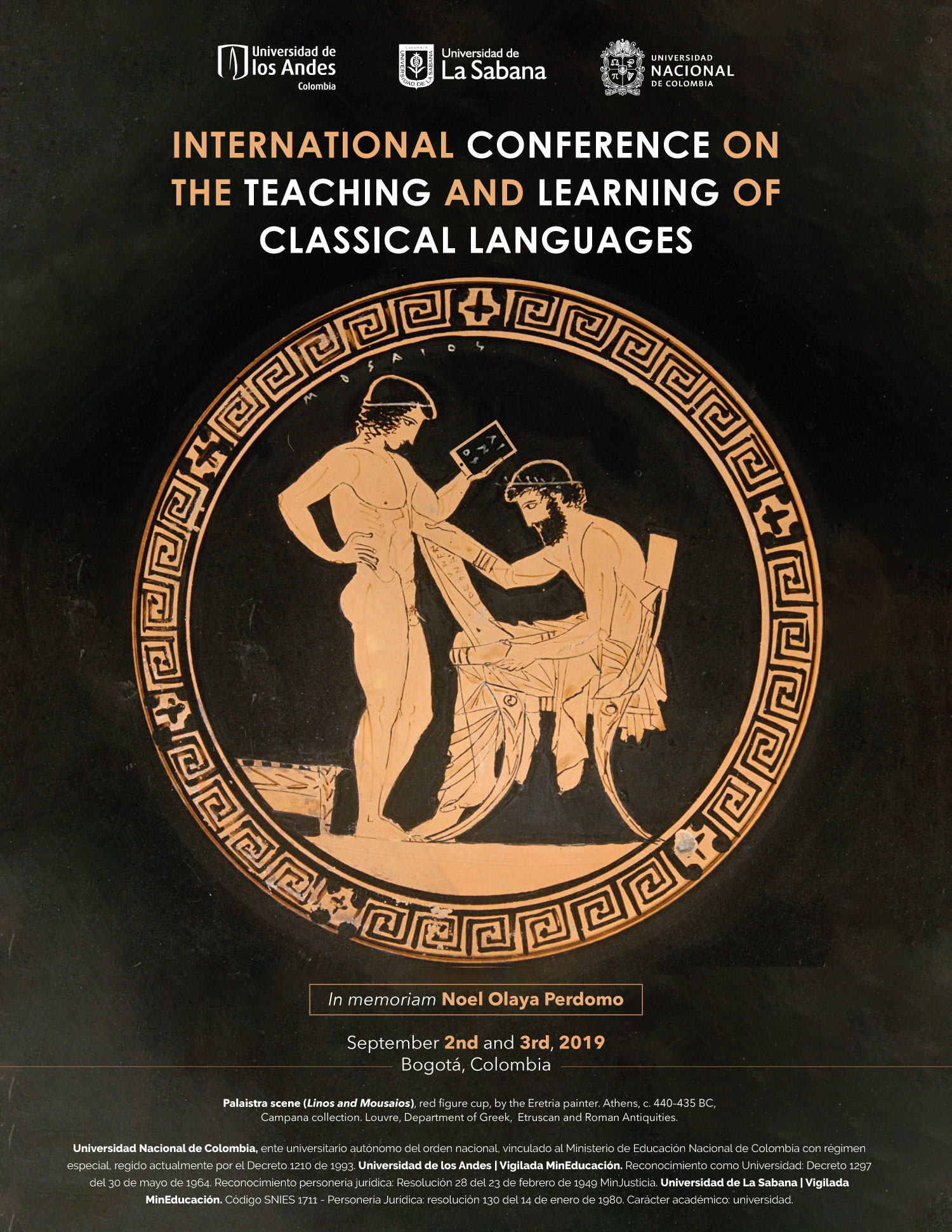
Call for papers – International Conference on the Teaching and Learning of Classical Languages
This post is also available in:
in memoriam Noel Olaya Perdomo
Teaching and learning classical languages in the 21st century require a space for reflection and dialogue in which professors and students share the successful pedagogical experiences gathered in the course of their formative practices and processes, as well as their linguistic research and the implications that these have on teaching-learning dynamics, since their spreading enriches and renews the educational process. This is explained by the fact that both teachers and students have their own strategies that allow them to spread, understand, and gain knowledge of classical languages more efficiently. These strategies, when shared with others, can be assessed and enhanced so that other people can use them. What is more, the development of Foreign Language teaching methodologies has gained momentum in recent decades, due to the advances in applied linguistics and research on language acquisition. For these reasons, these methodologies can be adapted with excellent results in teaching-learning processes of classical languages. Likewise, considering affective factors may contribute to a better learning environment in the classroom. At the same time, Learning and Knowledge Technologies (LKT) have significantly contributed to an improvement in learning through platforms and apps, making the learning of languages more enjoyable and interactive. The purpose of this Conference is to open up an appropriate space for sharing the experiences and knowledge of teachers
and students so that principles and work lines can be established for the design of better curricula.
During the Conference, a heartfelt tribute will be paid to perhaps the most famous professor and promoter of classical languages in Colombia in recent decades, Noel Olaya Perdomo, who died on November 5, 2018, at the age of 90. Professor Noel was linked to various academic and scientific institutions in our country, including Instituto Caro y Cuervo and Universidad Nacional de Colombia. During his academic activity, he always demonstrated not only generosity to share his knowledge, but also philological rigor. His teaching continued uninterruptedly throughout six decades, from 1957 at Seminario Mayor, until only a few weeks before his death, when giving lessons of Latin, Greek and Biblical Hebrew at home. Several generations of teachers and scholars were inspired by his love for both education and classical languages. His reputation as a wise man and as an excellent human being attracted to his classes people of diverse backgrounds and disciplines, who in turn admired him and became fond of him.
Professors and students of classical languages and cultures are invited to present workshops, thematic panels, or papers related to the Conference objectives. Priority will be given to submissions concerning research findings.
A non-exhaustive list of suggested topics is included below:
Grammar and lexicon
– New pragmatics-based approaches and the active use of the language for teaching grammar
– New lexicographical tools: term-specific dictionaries, illustrated dictionaries, online dictionaries, etc.
– Alternative methodologies for learning vocabulary
Cultural elements
– Including cultural aspects in classroom lessons: art, literature, history, music, etc.
– Multiculturalism and interculturality
Curricular design
– Planning and designing lesson plans
– New manuals for teaching classical languages
– Graded readings
Educational resources
– Innovative methodologies and activities
– Use of LKT for classical languages
Affective component
– Awareness, motivation, and affectivity in the classroom
– Multiple intelligences and learning styles
Teacher training
– Educational innovation
– Interdisciplinarity
Research methodology
– Linguistic research and its implications for the teaching of classical languages
– Designing and implementing measurement tools (questionnaires to determine the impact of activities, level tests to assess academic performance, questionnaires about students’ perceptions of their language skills, etc.)
History of the teaching of classical languages
Keynote speaker:
Christophe Rico (Polis. The Jerusalem Institute of Languages and Humanities).
Workshops should have a maximum length of 45 minutes; papers, 20 minutes, plus 10 minutes of discussion. Thematic panels should be composed of 3 to 5 people; they should have a maximum length of 2 hours, including discussion with the public. All proposals must include the following information and be sent through the corresponding links:
Workshop: Title, objective, summary (maximum 300 words), materials needed, level to which it is addressed (basic, medium, advanced, author), and length. facart.es/talleres-lenguasclasicas
Papers: Title and abstract (maximum 300 words). facart.es/ponencias-lenguasclasicas
Thematic panels: Title, names of the coordinator and the other participants, a brief presentation of the panel (maximum 100 words), and the abstracts of the papers (150-300 words). facart.es/mesas-lenguasclasicas
Languages: Spanish, Portuguese, Italian, French, or English.
Deadline: April 15th, 2019.
Contact: congresolenguasclasicas@gmail.com
Scientific committee:
Viki Makrí, Universidad de Salamanca
Ligia Ochoa, Universidad Nacional de Colombia
Rodrigo Verano, Universidad Autónoma de Madrid
Alfonso Mejía, Universidad Nacional de Colombia
Maribel Jiménez, Universidad Nacional Autónoma de México
Co-organizers:
Gemma Bernadó Ferrer, Universidad de los Andes
Juan Felipe González Calderón, Universidad Nacional de Colombia
Ronald Forero Álvarez, Universidad de La Sabana
